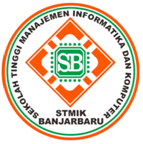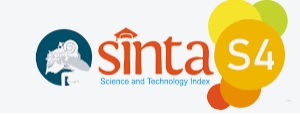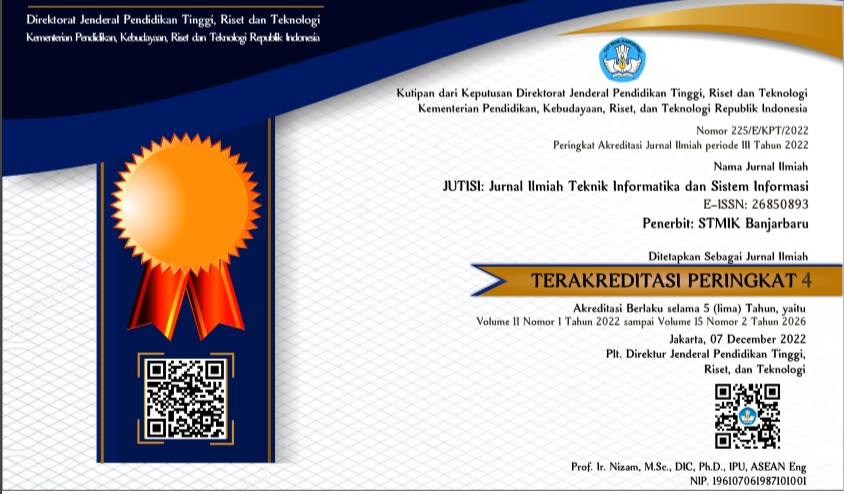Evaluasi Tingkat Kesuksesan Penerapan Aplikasi Hybrid Learning Perguruan Tinggi Menggunakan Model DeLone Dan McLean
Abstract
The evaluation of the implementation moodle-based Hybrid Learning applications has not carry out at a private computer college (PTSK) in Surabaya. This leads the difficulty to make decisions regarding application development because the success factors and weaknesses of the Hybrid Learning application are currently unknown. This study proposes the DeLone and McLean method to evaluate the implementation of Hybrid Learning applications in PTSK through six variables, namely: system quality, information quality, service quality, use, user satisfaction, and net benefits. As the Delone and McLean Model has multiple dimensions, data processing has been utilized by Structural Equation Modeling which could be able to confirm the certain model. In addition, this model can verify the effect of a variable on other variables. The primary data used was collected by questionnaire and processed using AMOS and SPSS software applications. The results of this study show the success level of implementing the Hybrid Learning application in PTSK has a great score that was defined by the six factors on the model. Â Nevertheless, the Service Quality factor needs rectification in order to enhance User Satisfaction and Use factor for users to obtain the maximum Net Benefit.
Keywords: Success Level; Application; Hybrid Learning; DeLone and McLean, Structural Equation ModelingÂ
Â
Abstrak. Belum adanya evaluasi penerapan aplikasi hybrid learning berbasis moodle pada Perguruan Tinggi Swasta bidang Komputer (PTSK) di Surabaya menyebabkan sulitnya pengambilan keputusan terkait pengembangan aplikasi tersebut. Hal ini karena tidak diketahui faktor penentu kesuksesan serta kekurangan aplikasi hybrid learning yang diterapkan. Penelitian ini mengusulkan metode DeLone dan McLean untuk mengevaluasi penerapan aplikasi hybrid learning di PTSK di Surabaya melalui enam faktor: system quality, information quality, service quality, use, user satisfaction, dan net benefit. Metode Structural Equation Modeling digunakan untuk mengonfirmasi ketepatan model dan menguji pengaruh suatu variabel terhadap variabel lain. Data primer yang digunakan dikumpulkan melalui kuesioner dan diolah dengan perangkat lunak AMOS dan SPSS. Hasil penelitian menunjukkan tingkat kesuksesan penerapan aplikasi hybrid learning di PTSK dinilai baik, ditunjukkan dengan nilai baik pada keenam faktor pada model. Namun demikian, perlu perbaikan pada faktor Service Quality untuk meningkatkan User Satisfaction, dan faktor Use agar pengguna merasakan Net Benefit secara maksimal.
Kata Kunci: Tingkat Kesuksesan; Aplikasi; Hybrid Learning; DeLone dan McLean, Structural Equation Modeling
References
L.M, Jeffrey, et al., “Blended Learning: How Teachers Balance the Blend of Online and Classroom Componentsâ€, Journal of Information Technology Education: Research, vol. 13, no. 2, pp. 121-140, 2014.
A. Sutisna, “Pengembangan Model Pembelajaran Blended Learning pada Pendidikan Kesetaraan Program Paket C dalam Meningkatkan Kemandirian Belajarâ€, Jurnal Teknologi Pendidikan, vol. 18, no. 3, pp. 156-168, 2016.
F.A. Fauzan, “Hybrid Learning sebagai Alternatif Model Pembelajaranâ€, Jurnal Teknologi Pendidikan, vol. 18, no. 3, pp. 156-168, Desember 2016, Seminar Nasional Profesionalisme Guru di Era Digital, Jakarta, 247-252, 2017.
Surat Edaran Keputusan Bersama 4 Menteri nomor 23425/A5/HK.01.04/2021 tentang Salinan Keputusan Bersama 4 Menteri Tentang Panduan Penyelenggaraan Pembelajaran Di Masa Pandemi Coronavirus Disease 2019 (COVID-19). http://kemdikbud.go.id [Diakses pada 20 Februari 2022].
A.S.M. Romli. Jurnalistik Online: Panduan Mengelola Online. Bandung: Nuansa Cendikia, 2012.
C. Costa, et al., “The Use of Moodle E-learning Platform: a Study in a Portuguese Universityâ€, Procedia Technology 5, pp. 334-343, 2012.
F. Hakam, Analisis, Perancangan dan Evaluasi Sistem Informasi Kesehatan, Yogyakarta: Gosyen Publishing, 2016.
L. Dorobat, “Models for Measuring E-Learning Success in Universities: A Literature Review,†Informatica Economica, vol. 18, no. 3, pp. 77-90, 2014.
H.B. Seta, et al., “E-Learning Success Model: An Extention of DeLone & McLen IS’ Success Modelâ€, Indonesian Journal of Electrical Engineering and Informaticsi, vol. 6, no. 3, pp. 281-291, 2018.
P.H. Saputro, A.D. Budiyanto, dan A.J. Santoso, “Model DeLone and Mclean untuk Mengukur Kesuksesan E-goverment Kota Pekalonganâ€, Scientific Journal of Informatics, vol. 2, no. 1, pp.1-8, 2015.
N. Agustina, dan E. Sutinah, “Model DeLone and McLean Untuk Menguji Kesuksesan Aplikasi Mobile Penerimaan Mahasiswa Baru,†Jurnal Nasional Infromatika dan Teknologi Jaringan, vol. 3, no. 2, pp.180-186, 2019.
A.I. Ojo, “Validation of the DeLone and McLean Information Systems Success Model,†Healthc Informatin Research, vol 23, no. 1, pp. 60-66, 2017.
A. Suradi, dan M. Windari, “Penerapan Model DeLone and Mclean Pada SI-PMB Online dari Perspektif Pengguna Untuk Meningkatkan Kualitas Layanan,†Jurnal Simetris, vol. 11, no. 1, pp.241-248, 2020.
R.J. Angelina, dan A.I. Suroso, “Analyzing E-Commerce Success using DeLone and Mclean Model,†Journal of Information Systems Engineering and Business Intelligence, vol. 5, no. 2, pp.156-162, 2019.
M. Waluyo, Mudah Cepat Tepat Penggunaan Tools Amos Dalam Aplikasi (SEM). Surabaya: UPN Veteran JATIM, 2016.
S. Haryono, “Mengenal Metode Structural Equation Modeling (SEM) Untuk Penelitian Manajemen Menggunakan AMOS 18.00,†Jurnal Ekonomi dan Bisnis STIE YPN, vol. VII, no. 1, pp. 23-34, 2014.
B. Mafazi, “The Analysis of E-Learning Success By Using DeLone and McLean Success Model (Case Study: Pertamina University)â€, Journal of Information Technology and Its Uilization, vol. 4, issue 1, pp. 29-34, 2021.
H. Mohammadi, “Investigating Users’ Perspectives on e-Learning: An Integration of TAM and IS Success Modelâ€, Computer in Human Behavior, vol. 45, pp. 359-374, 2015.
I. Hastuti, et al., “The User Satisfaction Level of E-Learning for Business and Management Subjects Based on Technology Acceptance Modelâ€, International Journal of Economics, Business and Accounting Research (IJEBAR), vol. 3, issue 3, pp. 185-195, 2019.
B.Al-Shargabi, et al., “The Adoption of an e-Learning System Using Information Systems Success Model: a case study of Jazan Universityâ€, PeerJ Computer Science, pp. 1-21, 2021.
C.G. Sevilla, et. al., Research Methods. Quezon City: Rex Printing Company, 2007.
I. Wagimin, dkk., “Model Kesuksesan Pembelajaran Dengan E-Learning Di Perguruan Tinggiâ€, Jurnal Teknologi Pendidikan INSANI, vol. 16, no. 1, pp. 23-35, 2014.
How To Cite This :
Refbacks
- There are currently no refbacks.











